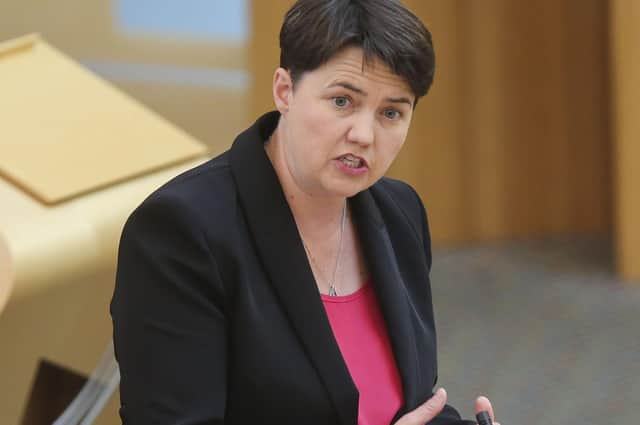Overlooked Tory hopefuls get better chance of becoming MSPs thanks to change in party rules


A small selection committee headed by former leader Ruth Davidson has been given powers to endorse candidates they believe should top the regional lists in the Scottish Parliament elections in May.
In Lothian, sources say it could help City Centre councillor Joanna Mowat after she suffered a surprise defeat in the selection for Edinburgh Central.
Advertisement
Hide AdAdvertisement
Hide AdAnd Lothian MSP Jeremy Balfour, who has not been selected in a seat, could also benefit if the committee decided to endorse him.
Voting papers will be sent out soon to party members in each region, inviting them to rank candidates to decide what order they will appear in on the ballot paper at the elections. The nearer the top, the more chance they will have of getting elected. Most of the current Tory MSPs were elected via the list rather than in constituencies.
Previously, only those fighting constituency seats were included for the list, but now others can apply to stand on the list too.
Allowing Ms Davidson’s committee to endorse particular candidates is seen as a way of promoting more diversity among the party’s candidates and boosting the chances of female or ethnic minority hopefuls who may not have been selected in a constituency.
Advertisement
Hide AdAdvertisement
Hide AdBut the move is being criticised internally for giving the leadership too much influence over who is likely to get to Holyrood.
An insider said: "There will be a full postal ballot of all members and supporters to rank the candidates but the big difference this time – and some people are not happy with it – is the selection committee will indicate they favour particular candidates and think they should be put at the top of the list.
"That's where they're going to try and get more gender balance and more ethnic minority candidates and others.
"In Lothian, there is only one female candidate out of all nine constituencies so it's expected the committee will endorse another one or two female candidates.
Advertisement
Hide AdAdvertisement
Hide Ad"the question is whether members will listen to that or not. A lot of members, particularly older people, trust the central organisation and they'll do what they're told - but not everyone will."
The insider said across Scotland the Tories had a few more female and ethnic minority candidates than before. "But in terms of winnable seats it's white, middle class, middle-aged males.
"Central office has spent a lot of time trying to work out a system that would allow them to essentially interfere in the system and try to skew it towards more diverse candidates and this is what they have come up with.”
Ms Davidson, who is quitting her Edinburgh Central seat at the election, said: “Our successes in recent years, consolidating the Scottish Conservatives as the main opposition, means we need the brightest and best. We also need to go beyond previous years where only constituency candidates could stand on the list and I'm delighted this means further pathways into elected politics for people from all backgrounds and with diverse experiences.”
A message from the Editor:
Thank you for reading this article. We're more reliant on your support than ever as the shift in consumer habits brought about by coronavirus impacts our advertisers.
If you haven't already, please consider supporting our trusted, fact-checked journalism by taking out a digital subscription.
Comment Guidelines
National World encourages reader discussion on our stories. User feedback, insights and back-and-forth exchanges add a rich layer of context to reporting. Please review our Community Guidelines before commenting.